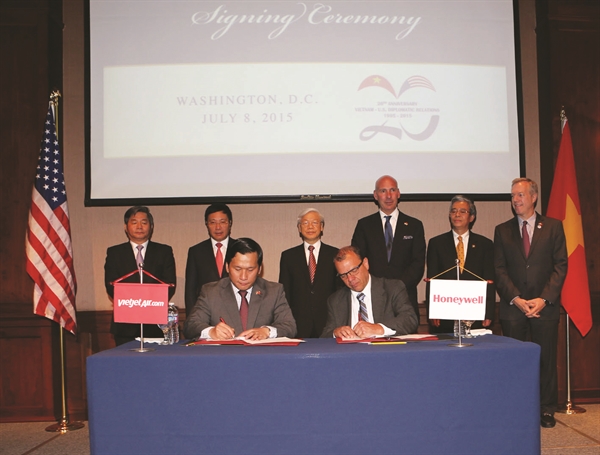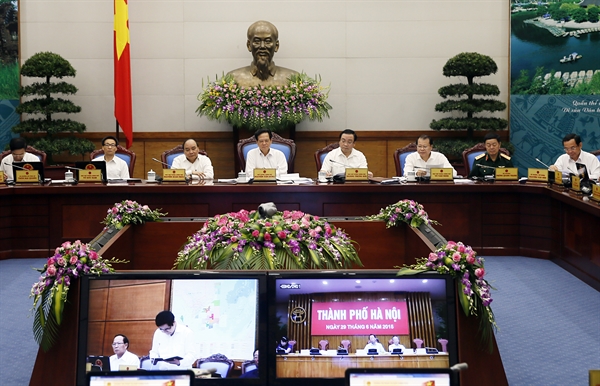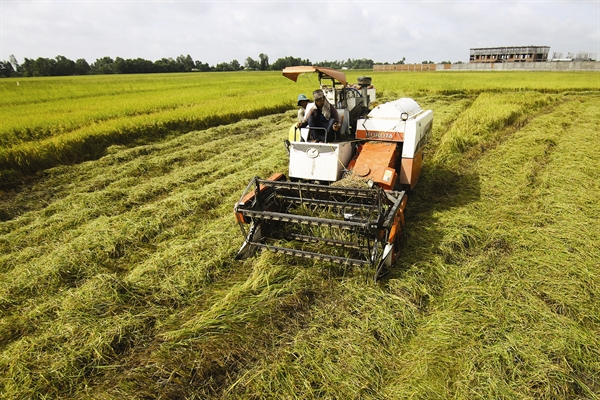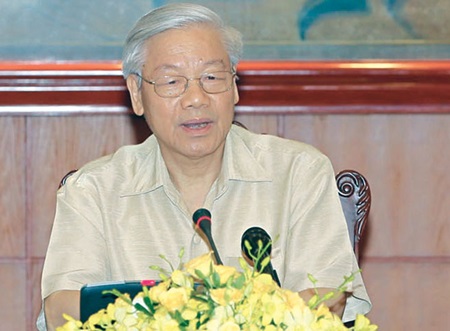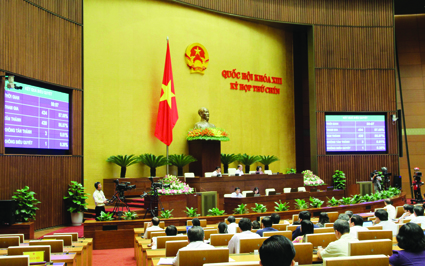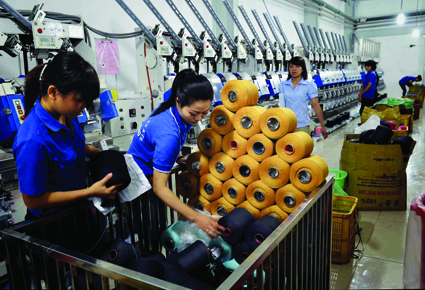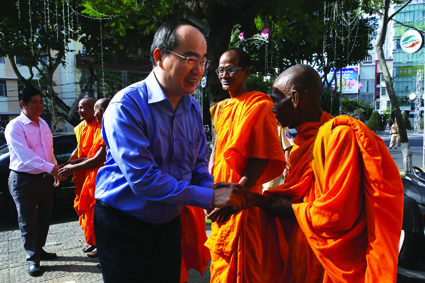Nguyen Hong Bac, LL.D
Law Faculty
Hanoi Law University
Principles of regulation
Basically, the 2014 Law on Marriage and Family (the 2014 Law) has fully perpetuated the principles laid down in the 2000 Law on Marriage and Family (the 2000 Law) but provides more explicitly the principles of applying foreign laws to marriage and family relations involving foreign elements.
Clause 2, Article 122 of the 2014 Law states: “If this Law and other legal documents of Vietnam refer to the application of a foreign law, such foreign law will apply, provided such application does not contravene the fundamental principles laid down in Article 2 of this Law.”
These fundamental principles include:
(i) Voluntary, progressive and monogamous marriage in which husband and wife are equal;
(ii) Marriage between Vietnamese citizens of different nationalities or religions, between religious and non-religious people, between people with beliefs and people without beliefs, and between Vietnamese citizens and foreigners shall be respected and protected by law;
(iii) To build prosperous, progressive and happy families; family members have the obligation to respect, attend to, care for, and assist one another; to treat children without discrimination;
(iv) The State and society and families shall protect and support children, elderly people and persons with disabilities in exercising marriage and family rights; assist mothers in properly fulfilling their lofty motherhood functions; and implement family planning; and
(v) To perpetuate and promote the Vietnamese nation’s fine cultural traditions and ethics on marriage and family.
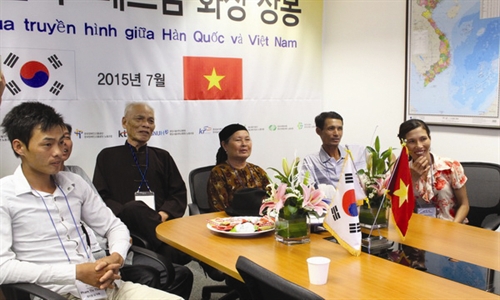 |
| Vietnamese families talk to their daughters/sisters, Vietnamese wives, in the Republic of Korea, on live-stream television on July 22 __Photo: baobaohiemxahoi.vn |
Foreign elements
Besides incorporating the 2000 Law’s provisions on foreign elements, the 2014 Law adds a number of new points, as follows:
Point c, Clause 14, Article 8 of the 2000 Law stipulates: “Marriage and family relations involving foreign elements are… marriage and family relations between Vietnamese citizens which are established, changed or terminated under the law of a foreign country.”
The phrase “under the law of a foreign country” fails to take into account cases involving Vietnamese citizens living abroad, for example, a Vietnamese citizen living abroad adopts a Vietnamese child also living abroad. In theory, the adoption relation in this example is considered involving foreign elements.
In order to address this limitation, Clause 25, Article 3 of the 2014 Law provides: “Marriage and family relations involving foreign elements are… marriage and family relations between Vietnamese citizens which are established, changed or terminated under the law of a foreign country, or arise abroad or the property related to which is located abroad.”
This new provision is in line with Article 758 of the 2005 Civil Code
Regarding overseas Vietnamese citizens as subjects of marriage and family relations involving foreign elements, the 2000 Law does not include these people in Clause 14, Article 8, which defines these relations, but only mentions them in Clause 4, Article 100. This has caused misunderstanding about these subjects.
To remedy this shortcoming, Clause 25, Article 3 of the 2014 Law clearly states: “Marriage and family relation involving foreign elements means the marriage and family relation in which at least one partner is a foreigner or an overseas Vietnamese or in which partners are Vietnamese citizens but the bases for establishing, changing or terminating that relation are governed by a foreign law, or that relation arises abroad or the property related to that relation is located abroad.”
Worth of note, the above definition no longer includes marriage and family relations between foreigners permanently residing in Vietnam as seen in the 2000 Law.
Competence to settle related matters
The provisions of the 2000 Law and its guiding document, Decree No. 24/2013/ND-CP, concerning the competence to settle cases of marriage and family relations involving foreign elements have appeared overlapping on this issue. To address this problem, the new Law determines this competence by referring to related legal documents.
Specifically, it says that the competence to register civil status related to marriage and family relations involving foreign elements must comply with the law on civil status.
Meanwhile, the competence to settle cases and matters of marriage and family involving foreign elements before court must comply with the Civil Procedure Code.
According to current regulations, provincial-level People’s Courts have jurisdiction to settle disputes over marriage and family relations with foreign elements. Some district-level People’s Courts may settle civil disputes over these marriage and family relations, if these disputes are not entrusted to Vietnamese consulates overseas or foreign courts.
In addition, Clause 3, Article 123 of the 2014 Law stipulates that district-level People’s Courts of localities where Vietnamese citizens reside are also competent to cancel illegal marriages, settle divorce cases, disputes over rights and obligations of husband and wife or parent and child, recognition of parents or children, child adoption and guardianship between Vietnamese citizens residing in border areas and citizens of neighboring countries living in areas bordering on Vietnam in accordance with this Law and other Vietnamese laws.
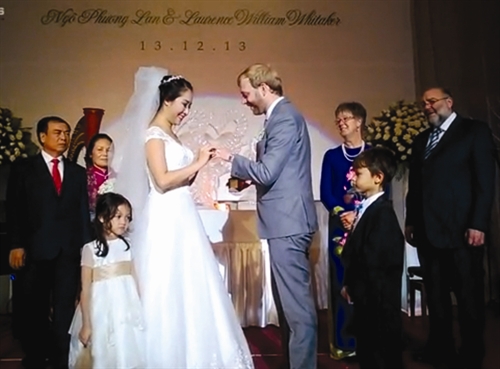 |
| Miss Vietnam World 2007 Ngo Phuong Lan and her husband Loz Whitaker in their wedding __Photo: Internet |
Consular legalization of papers and documents
Article 124 of the 2014 Law stipulates: "Papers established, granted or certified by competent foreign agencies for use in the settlement of cases and matters of marriage and family shall be consularly legalized, except cases eligible for exemption from consular legalization under treaties to which the Socialist Republic of Vietnam is a contracting party or on the principle of reciprocity.”
This provision is consistent with Article 10 of the 2014 Law on Civil Status.
Hence, if Vietnam and relevant countries has no agreement or do not apply the principle of reciprocity, all papers established, granted or certified by competent foreign agencies for use in the settlement of disputes over marriage and family must be consularly legalized. According to international practices and the 1963 Vienna Convention on Consular Relations, diplomatic missions and consular offices of foreign countries are competent to perform legalization. In Vietnam, legalization is provided in Decree 111/2011/ND-CP of December 5, 2011, on consular certification and legalization. Clause 2, Article 2 of this Decree stipulates:
“Consular legalization means the competent Vietnamese agencies’ certification of stamps, signatures and titles on foreign papers and documents for being recognized and used in Vietnam”.
This provision is conformable with international practices, and creates favorable conditions for competent Vietnamese agencies to properly legalize foreign papers and documents. The Decree also specifies papers and documents that must not be consularly certified or legalized so as to ensure national security, sovereignty and interests.
Consular legalization will be exempted if Vietnam and foreign countries have signed relevant agreements or apply the principle of reciprocity. Such exemption is also provided in the mutual legal assistance agreements Vietnam has concluded. Accordingly, foreign documents or papers are exempted from consular legalization without certification, i.e. documents or papers granted or certified by competent Vietnamese agencies will be naturally valid in countries which conclude these agreements with Vietnam, and vice versa. This provision has created favorable conditions for citizens of contracting member states to establish marriage and family relations, but it is easy to abuse with fake papers. Therefore, it is suggested that, in the current conditions, consular legalization exemption should be accompanied by certification, i.e. foreign papers must be exempted from consular legalization in Vietnam and vice versa only when their signatures and stamps and the competence of signatories are certified by a central agency of Vietnam or the foreign country. This legalization exemption is introduced in the 1961 Hague Convention Abolishing the Requirement of Legalization for Foreign Public Documents and has become popular around the world.
Recognition of judgments and decisions of foreign courts
Article 125 of the 2014 Law stipulates:
“1. The recognition of judgments and decisions on marriage and family of foreign courts with request for enforcement in Vietnam must comply with the Civil Procedure Code.
2. The Government shall prescribe the writing in civil status registers of matters of marriage and family according to judgments and decisions of foreign courts without request for enforcement in Vietnam or without request for non-recognition in Vietnam; and decisions on marriage and family of other competent foreign agencies.”
Clause 2 above is concretized in Articles 42 and 43 of Decree 126/2014/ND-CP as follows:
"The provincial-level Justice Department of the locality where the marriage of an applicant was registered or recorded must record in the civil status book this person’s divorce settled abroad. The provincial-level Justice Department can identify the locality where the applicant’s marriage was previously registered or recorded based on his or her declaration for recording of his or her divorce settled abroad and on the civil status book.
In case the applicant is a Vietnamese citizen coming from abroad to reside permanently in Vietnam and his or her marriage was registered at a representative mission or a competent foreign agency, the recording of his or her divorce must be made at the provincial-level Justice Department of the locality where this person permanently resides.
In case the applicant is a Vietnamese citizen currently residing abroad and his/her divorce and his or her marriage was registered at a representative mission or a competent foreign agency and has not been recorded in the book at a competent Vietnamese agency, the recording of his or her divorce must be made at the provincial-level Justice Department of the locality where this citizen resided before leaving the country, given such recording is not for the purpose of re-marriage.
In case the recording of the divorce in the civil status book is for the purpose of re-marriage, the provincial-level Justice Department of the locality where the applicant submits the marriage registration dossier is competent to record the divorce.
According to Article 43, the following divorces settled abroad must be recorded in the civil status book:
+ A Vietnamese citizen who divorced abroad returns to permanently reside in Vietnam and requests the grant of a marital status certificate or carries out marriage procedures;
+ An overseas Vietnamese citizen who divorced abroad requests marriage at a competent Vietnamese agency;
+ A foreigner who divorced a Vietnamese citizen abroad requests marriage in Vietnam;
+ A person who had registered his or her marriage or had it recorded at a competent Vietnamese agency then divorced abroad requests civil status registration at a competent Vietnamese agency.
The civil status registration agency must settle other cases of request for recording in the civil status book of divorces settled abroad.
For a person who has divorced many times, only the last divorce must be recorded in the civil status book.
Identification of parents and children involving foreign elements
Article 128 of the 2014 Law clearly determines the competence to deal with cases of identification of parents and children involving foreign elements, as follows:
Vietnamese civil status registration agencies are competent to settle the dispute-free identification of parents and children between Vietnamese citizens and foreigners or between Vietnamese citizens at least one of whom resides abroad, or between foreigners at least of one of whom permanently resides in Vietnam in accordance with the law on civil status.
According to Article 31 of Decree 126/2014/ND-CP, the Vietnamese civil status registration agency competent to recognize and register the above cases of parent or child recognition is the provincial-level Justice Department of the locality where the recognized parent or child registers his or her permanent residence.
In case the recognized parent or child is a Vietnamese citizen who has registered only temporary residence but not permanent residence in accordance with the residence law, the provincial-level Justice Department of the locality where that person has registered temporary residence must recognize and register the parent or child recognition.
The representative mission in the host country is responsible for recognizing and registering a foreigner’s recognition of a Vietnamese citizen who lives in such country as his/her parent or child if such registration does not contravene the law of the host country. For parent or child recognition between two overseas Vietnamese citizens, the representative mission based in the country of residence of either party will recognize and register their parent or child recognition.
Meanwhile, according to Article 128 of the 2014 Law, competent Vietnamese courts will settle the identification of parents and children involving foreign elements in the following cases:
+ A parent does not recognize a child;
+ A person who is recognized as the parent of a person requests a court to identify that the latter is not his/her child;
+ An adult recognizes his/her parent without consent of the other parent;
+ The gestational carrier party requests a court to oblige the gestational surrogacy requesting party to receive the child when the latter refuses to receive that child;
+ A gestational surrogacy requesting party that delays receipt of his/her child or breaches the child nursing and caring obligations;
+ The gestational surrogacy requesting party requests a court to oblige the gestational carrier party to deliver the child when the latter refuses to deliver that child;
+ Disputes related to giving birth with assisted reproductive technology and altruistic gestational surrogacy;
+ Other disputed cases.
To concretize Article 128, Decree 126/2014/ND-CP sets out several conditions for parent or child recognition in Article 30:
The parent or child recognition between a Vietnamese citizen and a foreigner, between Vietnamese citizens at least one of whom resides abroad, or between foreigners at least one of whom permanently resides in Vietnam may be settled only when it is voluntary and dispute-free and both parties are alive at the time of dossier submission. Should one or both parties no longer be alive at the time of dossier submission or there is a dispute over the parent or child identification, the case must be brought to court.
Recognition of a child who is a minor must be consented by his or her mother or father unless the mother or father has died, is missing or has lost her or his civil act capacity. Recognition of a child who is full 9 years or older is subject to his or her consent.
Recognition of a parent by an adult child does require the consent of the other parent. For recognition of a parent by a minor child, the other parent of this child must carry out the procedures for the child. For recognition of a parent by a minor child whose other parent has died, is missing or has lost her or his civil act capacity, the guardian of this child must carry out parent recognition procedures.
 |
| A happy inter-country couple __Photo: Internet |
Support obligation
Article 129 of the 2014 Law deals with two matters related to support obligation: law application and dispute-settling competence.
Recent years have seen an increasing number of lawsuits to request support (especially child raising support) between Vietnamese citizens and citizens of countries with which Vietnam has not yet concluded any agreements. Meanwhile, the mutual legal assistance agreements already concluded between Vietnam and other countries only deal with legal conflicts over parent-child support. Taking into account this problem, Article 129 has been designed to regulate all support relations including support between spouses, parent and child, and family members.
Clause 1 of this Article stipulates: “The support obligation must comply with the law of the country where the support requester resides. In case the requester has no place of residence in Vietnam, the law of the country of his/her citizenship shall apply.”
The application of the law of the country where the support requester resides has two advantages.First, the court in the country where the support requester resides can easily determine whether this person is eligible for the support. If there is no evidence showing that this person has financial difficulties, the court can reject his or her request. Second, the application of the law of the country where the support requester resides will help protect his or her interests as prescribed by law.
Regarding the competence to settle disputes, Clause 2 of Article 129 states: “Agencies competent to settle support requests of the persons prescribed in Clause 1 of this Article are agencies of the country where the requesters reside.”
Matrimonial property regime
The 2000 Law only provides the statutory matrimonial property regime, which does not allow married couples to settle their property conflicts by agreement or decide on their own properties acquired before marriage as suitable to their conditions and circumstances.
The 2014 Law additionally recognizes the agreed matrimonial property regime with specific provisions. If a married couple selects the agreed property regime, this agreement must be made in writing before their marriage and be notarized or certified. The agreed matrimonial property regime must be established on the date of marriage registration. The couple may decide by themselves contents of the agreement, which must, however, contain certain basic contents: property determined as common property and separate property of husband and wife; rights and obligations of husband and wife toward common property, separate property and related transactions; property to meet the family’s essential needs; and conditions, procedures and principles of property division upon termination of the property regime. For matters arising in the implementation of the agreed property regime but not yet agreed or unclearly agreed by husband and wife, they can be settled according to Articles 29, 30, 31 and 32 of the 2014 Law, and relevant provisions of the statutory property regime.
The 2014 Law also entitle husband and wife to modify their property regime agreements. In this case, the modified agreements must be notarized and certified.
It further states that once the agreed matrimonial property regime is applied, the settlement of property upon divorce must comply with such agreement. In case the agreement is insufficient or unclear, the settlement must comply with relevant provisions of Clauses 2, 3, 4 and 5 of Article 59 and Articles 60, 61, 62, 63 and 64 of the Law.
In addition, Decree No. 126/2014/ND-CP stipulates that when husband and wife enter into a transaction with a third party, they must inform that party of their agreed matrimonial property regime.
For the settlement of property disputes according to the agreed matrimonial property regime, Article 130 of the 2014 Law stipulates: “In case of receiving requests for settlement of the application of the agreed matrimonial property regime; or relations of men and women co-living as husband and wife without marriage registration involving foreign elements, competent Vietnamese agencies shall apply the provisions of this Law and other relevant Vietnamese laws to settle these requests.”
In the current context of the market economy, the legalization of the agreed matrimonial property regime provides a ground for proper settlement of disputes over spousal property and conforms to other countries’ laws.-
